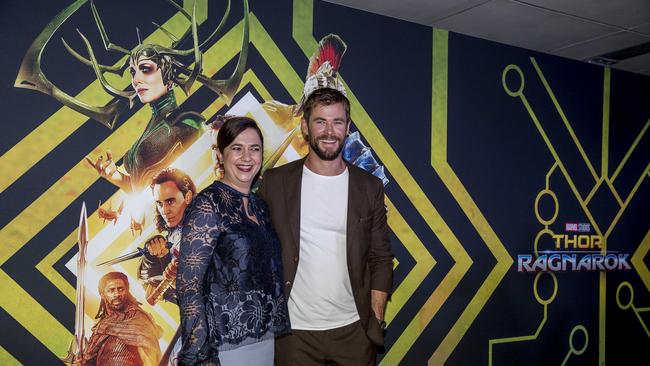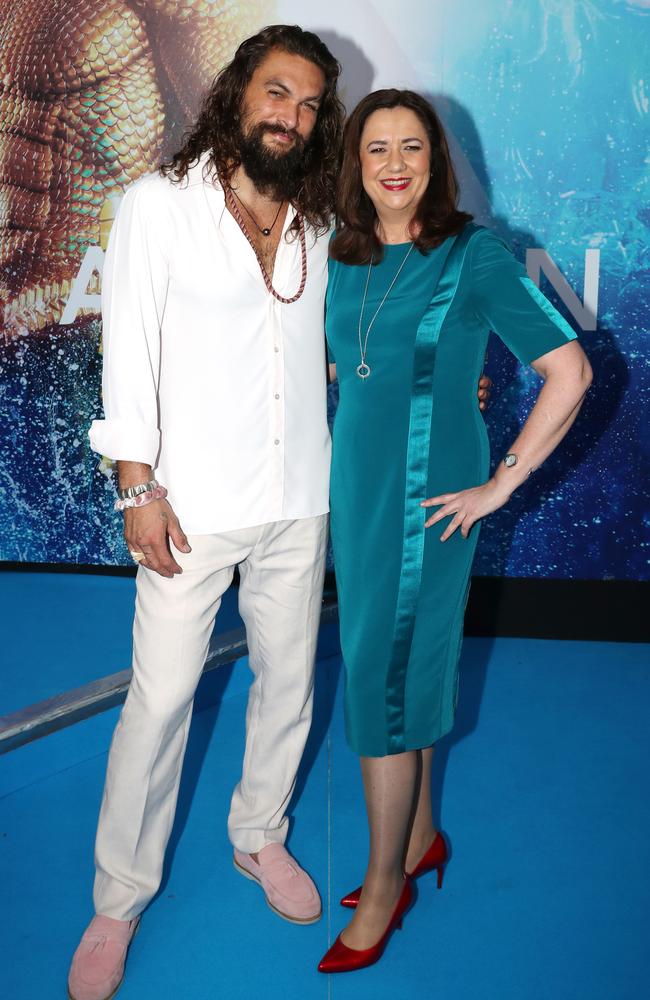Secrecy shrouds taxpayer-funded film jobs
Queensland is compiling an impressive resume of Hollywood blockbusters filmed there, but behind the red-carpet glitz is a disturbing reality.

QLD News
Don't miss out on the headlines from QLD News. Followed categories will be added to My News.
Queensland taxpayers are spending millions of dollars luring big-budget productions to our shores, but being kept in the dark when it comes to how many local jobs the projects actually create.
An impenetrable veil of secrecy surrounds the taxpayer-funded incentive system luring a string of Hollywood productions to Queensland over more than a decade, a Courier-Mail investigation can reveal, with decision-makers keeping key outcomes of the hand-outs a closely guarded secret.
Tom Hanks returns to quarantine on the Gold Coast with Baz Luhrmann’s Elvis movie set to resume
How Qld state-owned companies can dodge freedom of information laws
Qld not getting value for money luring blockbusters: review
Taxpayers are not allowed to know how much of their money has been poured into luring individual productions, with both the State Government and its wholly owned film investment company Screen Queensland arguing the figures must be kept secret to protect commercial interests.
That means the amount of state funding handed over for projects like, most recently, the Baz Luhrmann-directed Elvis biopic being filmed on the Gold Coast remains a secret.
Screen Queensland has spent more than $85.7 million since 2015-16 on its Production Attraction Strategy, which the State Government said had lured 28 productions so far.
But attempts to weigh up whether the number of jobs created was worthy of the money shelled out has been made impossible while authorities refuse to detail how much each production was handed.
Adding to the secrecy, Screen Queensland has publicly released just one report analysing the economic impacts of the film projects, including the number of full-time jobs actually created, since 2014.
And Screen Queensland has also steadfastly refused to even detail how it classifies a full-time job on the productions.
Meanwhile, politicians have fronted the media to announce a stream of big-budget films claimed to have created more than 8000 jobs over 11 productions, government media releases show.

But industry sources say the evaporation of jobs during the COVID-19 restrictions exposed a failure to foster a stable local business network that does not rely on subsidies to operate.
“What this demonstrated, and what has been commonly known for many years now, is that the screen industry has few established businesses employing full time staff despite the vast amount of taxpayer money which has been invested in the sector,” local producer Chris Boyd said.
Inquiries by the newspaper reveal that while Screen Queensland ordered economic impact reports for some productions post-filming, it has released just one of those reports publicly.
That was for the 2015-filmed Pirates of the Caribbean, starring Johnny Depp.
The reports examine the number of jobs actually created and the value to the local economy.
The Pirates economic impact report counts the number of full-time local jobs in the hundreds.
That is despite the Campbell Newman-led Government in 2014 announcing Disney’s decision to film in Queensland would create “thousands” of local jobs.
The 2016 economic impact report for Screen Queensland found that while 2142 Queenslanders were hired for the five-month filming, that equated to just 401 full-time positions.
While never revealed, industry sources believe the state-incentive to lure Pirates was between $10-15 million. It also received a $21.6 million Commonwealth contribution.

Adding to the secrecy, Screen Queensland refuses to say how long someone must be hired to be classed full-time.
A spokeswoman initially told the newspaper the full-time equivalent definition was “based on methodology set out in the report” and was consistent with that used elsewhere in the film sector.
But the seven-page “summary of key findings” contains no explanation of what qualified as a full-time job in its figures other than stating it used “defensible and sound methodology.”
Screen Queensland has rejected that an extra on set for one day would be counted as a full-time equivalent, but has refused to reveal how many hours would need to be worked to meet the definition.
“The screen industry is comprised of project-based work and does not operate in a traditional full-time equivalent environment,” she said.
“However occasionally economic impact reports are generated.”
When asked for copies of the reports on other taxpayer-backed productions, Screen Queensland said only the seven-page Pirates report had been publicly released to date.
That was out of at least 11 major film and television productions to attract incentives since 2014.
It means claims by politicians the films created thousands of jobs can never be publicly scrutinised and no breakdown on the duration or type of jobs created for locals is ever released.

Yet Premier Annastacia Palaszczuk has insisted job creation was a key justification for the taxpayer-funded film incentives.
When announcing Dora the Explorer had been lured to Queensland in 2018 for instance, she said the decision to provide competitive incentives came down to “a single criteria: creating jobs.”
A spokesman for Ms Palaszczuk earlier this year defended the grants, saying the screen industry had generated 7500 jobs and $679 million for the state economy since 2015.
He said the incentives included a payroll tax rebate, which can only be claimed if spending In Queensland had surpassed $3.5 million. Individual incentives for films were commercial-in-confidence, he said.
Screen Queensland had argued the individual incentive figures have a commercial value that could be destroyed or diminished by releasing it. A spokesman said it had created “thousands of direct industry jobs and thousands more indirect through the supply chain, boosting the economy by hundreds of millions of dollars.”
Local Glass Media Group television producer Chris Boyd has been pushing for more transparency around the value for money of film incentives since as early as 2015.
He launched the Gold Coast Production Media Network in June, which aims to reform and improve the Gold Coast screen production industry, after years of screen funding “mismanagement”.

The father-of-two wants international productions that scored grants to be audited by an independent body.
He questioned how long a worker had to be on set to qualify as a local job, along with whether their job position was beneficial to growing the local film industry.
Mr Boyd has previously gone head-to-head with the Government and Screen Queensland in fighting for the release of the incentive figure paid to Disney for Pirates of the Caribbean, using Right to Information laws.
While the State Government and Screen Queensland fought hard to keep the incentive figure secret, the state’s independent Right to Information umpire ordered it should be released.
However, Screen Queensland successfully appealed to a tribunal in 2019 to overturn the decision.
As previously revealed by the newspaper, the funding was handed to Disney for Pirates despite a secretive report commissioned by Queensland Treasury warning film incentives were a waste of taxpayer funds.
The report, obtained by the newspaper this year under RTI laws, then warned that most of the value of the tax breaks would flow to Hollywood producers rather than the host location.
“To win a project, a location will have to pay the producer at least some of, and maybe a substantial proportion of, the value of whatever positive effects it perceives will flow from hosting the project,” the review found.
“The fact that producers will capture most/all of (the) value that a location assigns to securing a production is the most compelling economic argument against jurisdictions offering financial incentives to attract international film productions.”
Originally published as Secrecy shrouds taxpayer-funded film jobs
